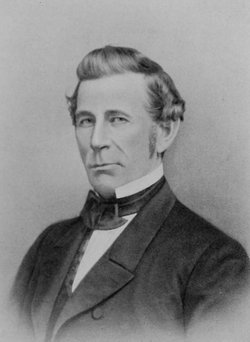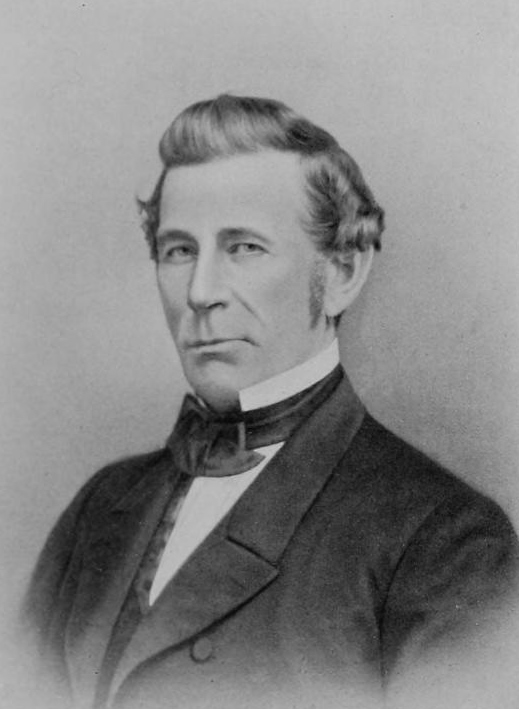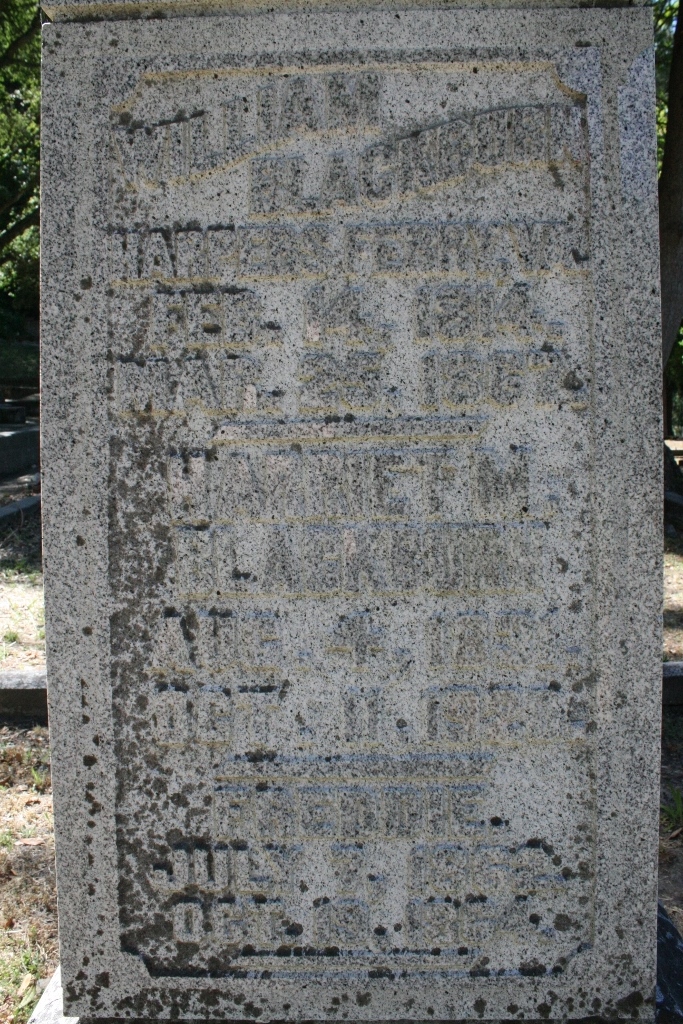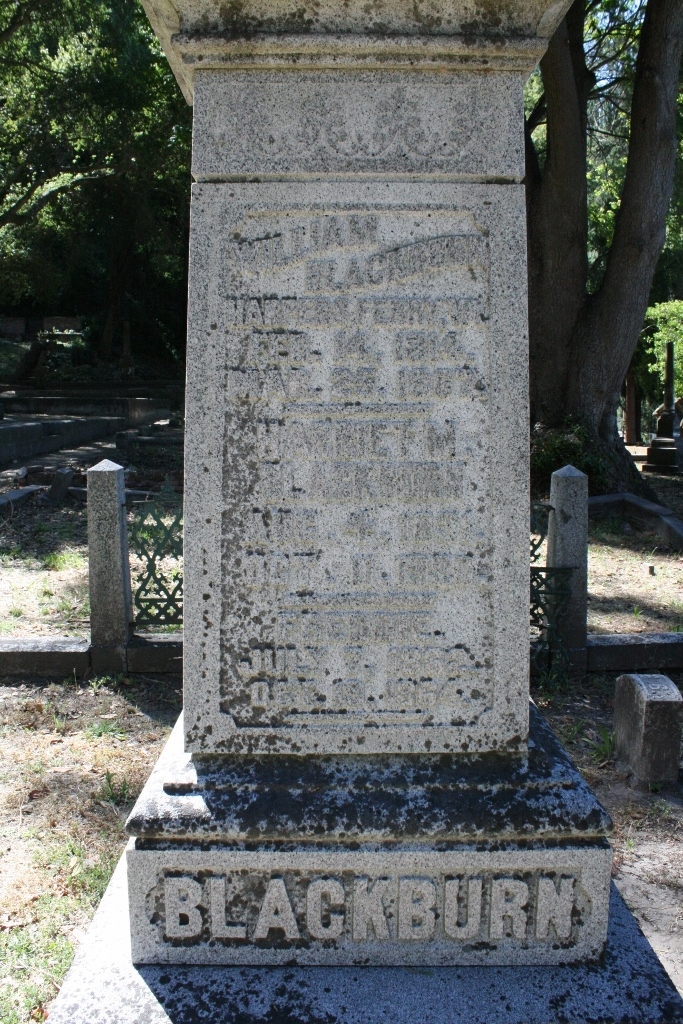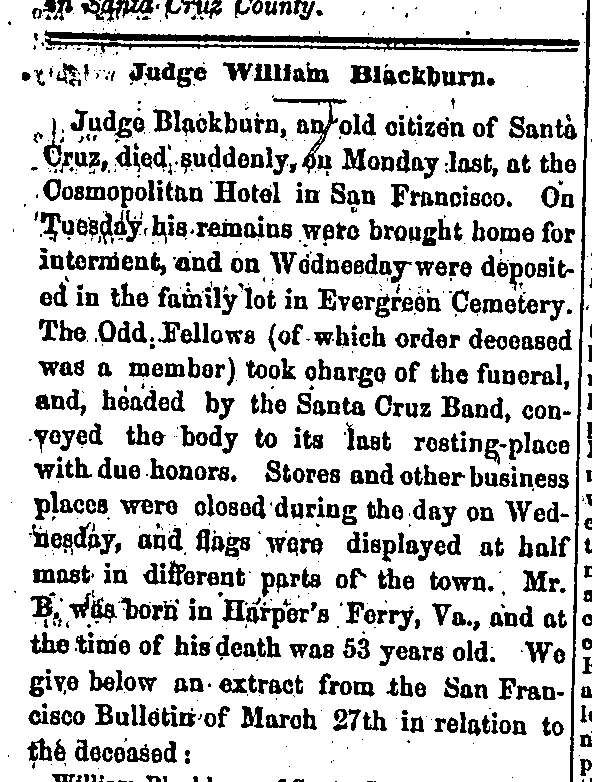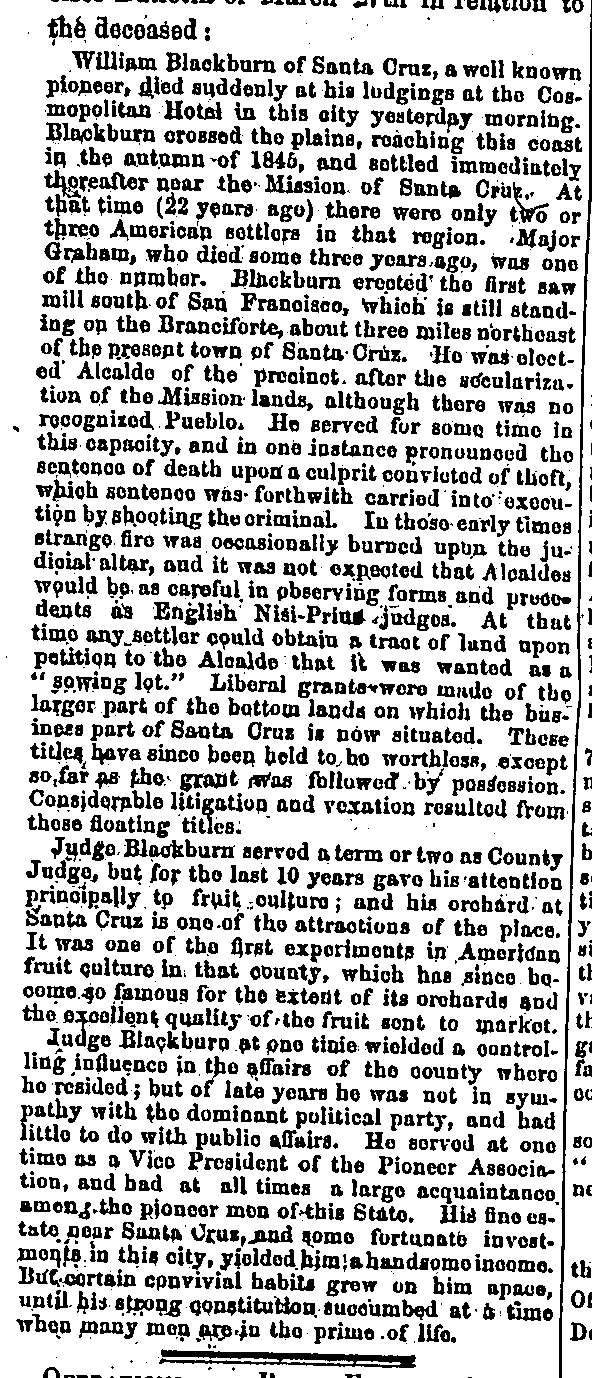==
D.D. BLACKBURN
All visitors to the famous hot springs of Paso de Robles have formed the acquaintance of Daniel Drew Blackburn, the senior proprietor of that pleasant resort.
Mr. Blackburn, of the old "Mother of States," was born at Harper's Ferry, Jefferson County, Virginia, on April 8, 1816. His hale and hearty good looks and stalwart frame shows that he came of good stock, and he can boast of his family record as well as of their physical structure.
His father was Joseph Blackburn, both at Charleston, Virginia; who served in the War of 1812 and was wounded at the battle of Fort McHenry, in the desperate defense of the city of Baltimore in 1814, when the British were repulsed and their invasion of Maryland frustrated.
The progenitor of the Blackburns came from England in early colonial times. The maiden name of his mother was Margaret Drew, daughter of Michael Drew, who was a native of Edinburgh, Scotland, and when a lad came to America, settling in Virginia while it was a colony of Great Britain, and served in the patriot army through the War of the Revolution. He was with Gen. Anthony Wayne at the storming of Stoney Point, and with Washington at the crowning success of the war in the siege of Yorktown, witnessing the surrender of Cornwallis and the British Army.
The parents of Mr. Blackburn moved to Springfield, Clark County, Ohio in 1822. In that pleasant section of the world, he grew to manhood, attending school in Springfield acquiring a good education, and learning the trade of carpenter.
A goodly array of brothers and sisters made up the family of Mr. Blackburn, in the order of their age as follows: Mary Ann, now the wife of James Morgan, of Santa Cruz; William; Daniel D.; Maria, wife of the late Captain Findley of Wheatland, Yuba County; James H. and Jacob A. of Watsonville.
Judge William Blackburn was one of the historical characters of California. He was one of the early pioneers, coming to this coast in 1844, and settling in Santa Cruz, at once taking a prominent part in the affairs of the country, becoming one of the active members of the American Colony which led the way for the final transfer of California to the Union.
In the war of conquest, he joined the battalion of volunteers under Fremont and was Lieutenant of the company and marched with the army to Los Angeles. Returning to Santa Cruz, he engaged in the business of merchant and was appointed Alcalde by Governor Mason.
Many anecdotes are related to him, showing his decision of character, promptness of action, and his original manner of dispensing justice. Somare exceedingly humorous and some quite tragic. On one occasion a young man was brought before him charged with having sheared the mane of a horse close to the neck and the hair of the tail, leaving but a barre stump. The ludicrous appearance of the horse was proof of the act committed, and the evidence of the prisoner's guilt was conclusive.
Alcade Blackburn sent for the barber, ordered the culprit to be seated, and directed the tonsorial artist to shear and shave the dark flowing locks and curling mustache, which was the pride and glory of the vain wearer. The shearing and shaving were hardly accomplished when the counsel for the prisoner entered and moved an arrest of judgment.
"Oh, yes," said Blackburn, "as the shears and the razor have done their work, judgment may now rest." "And under what law," inquired the learned council, "has this penalty been inflicted.?"
"Under the mosiac," replied the Alcalde; "that good old rule--an eye for an eye, tooth for a tooth, hair for hair." "But," said the Biblical jurist, "that was the law of the Old Testament, which has been abrogated in the New." "But we are still living," returned the Alcalde, "under the old dispensation, and must continue there until Congress shall sanction a new order of things." "Well, well," continued the counsel, old dispensation or new the penalty was too severe --a man's head against a horse's tail!" "That is not the question," rejoined Blackburn; "it is the hair on the other; now as there are forty fiddles to one wig in California, the inference is just, that horsehair of the two is in most demand, and that the greatest sufferer in this case is still the owner of the steed." "But then, murmured the ingenious counsel, "you should consider the young man's pride." "Yes, yes," responded the Alcade, "I considered all that and considered to the stump of that horse's tail and the just pride of the owner. Your client will recover his crop much sooner than the other and will manage, I hope, to keep it free of the barber's department in this court;" with this client and counsel were dismissed.
Another instance was of a different character. A Californian murdered his wife and fled to the church for refuge., it is understood that from the portals of the sacred edifice, no person could be taken by officers of the law. The church was closed but he thrust his finger in the keyhole and thought himself safe.
But there were Americans among his pursuers who knew no such law, and the murderer was taken, and before Alcalde Blackburn was tried for his crime. It seems a strange court in which to try a person for a capital offense, but it was under Mexican law, and by his own countrymen the prisoner was convicted, and under Mexican law he was sentenced to be shot. In such cases, Governor Mason required the findings of the court to be reported to him for approval before carrying the sentence into execution. The prisoner was guilty of an enormous crime yet there were fears that the Governor would disapprove the sentence, therefore to make sure of justice Blackburn ordered the execution simultaneously with forwarding the report of the case to the Governor. As was expected the Governor ordered a stay of the execution until he could inquire more fully into the case, but was answered that satisfaction had been given and the man was dead.
Many other anecdotes are told of the manner of meting out justice in Alcalde's court of Santa Cruz in 1848. Judge Blackburn was elected to represent Sacramento District in the Constitutional Convention of 1849, but being engrossed in the exciting business of that time he did not attend.
Upon the organization of the county of Santa Cruz, he was elected its first County Judge and was afterward a successful merchant in that town. He died a few years since in San Francisco while there on business, and his remains were taken to Santa Cruz by the Society of Pioneers and there buried.
--
D. D.Blackburn remained at his home in Springfield until 1837, when he went to Oquakee, Henderson County, Illinois, and there worked at his trade of carpenter, continuing in that work two years and then engaging as a clerk in the store of Mr. Phlps, where he remained for three years. He then formed a partnership in the company of Sweezey, Seymour & Blackburn in the business of pork-packing in the town of Oquakee, and continued in that business until the spring of 1849. The business had been successful, packing from 65,000 to 75,000 head of hogs annually and shipping them down the Mississippi to market.
But 1849 opened a new field. His elder brother, William, had gone to California in 1844, and rote home glowing accounts of the fair country, and all the family desired to join him in the land of promise. The discovery of gold was hardly needed t cause him to emigrate, but it was an additional incentive, and he and his brothers, James and Jacob, and brother-in-law Findley, his partner, Henry Seymour, and James Westerfield, prepared at once for the journey. A fine outfit was provided, consisting of three wagons with three yokes of oxen to each and a two-year supply of provisions.
Joining a train of 120 men under Captain McCullough, they crossed the Missouri River at Iowa POint on the 5th of May, 1849, and proceeded on their way across the plains and mountains to California, enjoying the journey as hale and hearty men can, arriving without other loss than one ox in the gold mines on Deer Creek on the 12th of August, 1849.
At that time, there was no sign that a white man had ever been in that neighborhood, and the Blackburns and party were the first to mine in the region since celebrated as Nevada City. The mines were very rich and they took the gold out by handfuls. Better mines were looked for and some in the party went to the South Yuba River where for two weeks they made about $50.00 a day each, then tried the North Fork, and returned to Deer Creek.
They mined with astonishing success until November 1st, when, Captain Findley becoming sick, they sold their teams and the remaining provisions for more than the original cost of all and went to the Sacramento Valley. William Blackburn was then at Sutterville, in company with John McDougal, afterward Governor, attempting to build a rival city to Sacramento.
After spending a week or two in Sacramento and San Francisco, D. D., James, Jacob Blackburn, and Mr. Seymour went to Santa Cruz, arriving there in the latter part of November, with $3,000 each as the result of their mining and sale of outfit. Captain Findley, the brother-in-law, soon followed.
D.D.Blackburn engaged in farming on his brother William's land, on shares, cultivating potatoes which sold in the field at from six to twelve cents per pound, and on a lot from one acre in September 1850, brought clear $1,200. He farmed eighty acres in various products. Leased some land at $100 an acre. Continued in the business until 1857 when, in June of that year, he went to Paso Robles and in company with James H. Blackburn and Lazarus Godchaux, purchased Petronillo Rios the Paso Robles Rancho, of six leagues of land including the famous hot springs, paying therefore $8,000. In 1860 the firm divided the rancho, Daniel taking one league, including the springs. There has since been his home, finding it a barren wilderness and making it in the course of years the pleasant village and favorite Resort in the state. He sold a half-interest to a Mr. McGreel, who in 1865 sold to D.W. James for $11,000, and in 1873 sold another one-fourth interest to James. H. Blackburn.
Mr. Blackburn has been mentioned in the history of the Vigilance Committee of 1858. At that period there was a call for the strong and the brave to come forward and risk their lives in overpowering the murdering banditti who made the roads a terror, and to establish a reign of law and order. Blackburn was the man for the occasion and was made sheriff of the county, but he stepped aside while the Vigilance Committee was in possession of affairs, and Blackburn as its officer had full power.
He made many arrests of many desperados and drove the infamous Jack Powers out of the State. This is all the office he has held or would accept. In politics, he is a Democrat and exercises much influence in his party. In social affairs, he is the genial gentleman that makes his guest at home in the well-kept hotel of the Paso de Robles Hot Springs.
Mr. Blackburn is a member of the Masonic Order and has passed through all the degrees to Royal Arch, joining Santa Cruz Chapter, No. 38, R. A. M., June 7, A. I. 2,400.
He was married in San Luis Obispo by Rev. Father Sastre, on September 15, 1866, to Miss Celia Dunn, daughter of Patrick and Mary Ann Dunn, a native of Australia and of Irish descent. Mrs. Blackburn is the sister of Mrs. D. W. James, who was married at the same time and place and is the sister of P.H. Dunn, Esq., the Postmaster at Paso Robles and business manager of the Hot Springs Hotel.
Mr. and Mrs. Blackburn had born to them ten children. nine of whom are living: James W; Francis J.; Henry H; Margaret; Daniel E.; Nellie; Annie, Harriet; and Frederick. A daughter, Jennie, was killed by the upsetting of a wagon, the others are in the usual health of that healthy locality, bright, handsome, and vigorous.
History of San Luis Obispo County, California Chapter XLV.
Towns and localities continued ~ transcribed by Kerry 48011981
==
D.D. BLACKBURN
All visitors to the famous hot springs of Paso de Robles have formed the acquaintance of Daniel Drew Blackburn, the senior proprietor of that pleasant resort.
Mr. Blackburn, of the old "Mother of States," was born at Harper's Ferry, Jefferson County, Virginia, on April 8, 1816. His hale and hearty good looks and stalwart frame shows that he came of good stock, and he can boast of his family record as well as of their physical structure.
His father was Joseph Blackburn, both at Charleston, Virginia; who served in the War of 1812 and was wounded at the battle of Fort McHenry, in the desperate defense of the city of Baltimore in 1814, when the British were repulsed and their invasion of Maryland frustrated.
The progenitor of the Blackburns came from England in early colonial times. The maiden name of his mother was Margaret Drew, daughter of Michael Drew, who was a native of Edinburgh, Scotland, and when a lad came to America, settling in Virginia while it was a colony of Great Britain, and served in the patriot army through the War of the Revolution. He was with Gen. Anthony Wayne at the storming of Stoney Point, and with Washington at the crowning success of the war in the siege of Yorktown, witnessing the surrender of Cornwallis and the British Army.
The parents of Mr. Blackburn moved to Springfield, Clark County, Ohio in 1822. In that pleasant section of the world, he grew to manhood, attending school in Springfield acquiring a good education, and learning the trade of carpenter.
A goodly array of brothers and sisters made up the family of Mr. Blackburn, in the order of their age as follows: Mary Ann, now the wife of James Morgan, of Santa Cruz; William; Daniel D.; Maria, wife of the late Captain Findley of Wheatland, Yuba County; James H. and Jacob A. of Watsonville.
Judge William Blackburn was one of the historical characters of California. He was one of the early pioneers, coming to this coast in 1844, and settling in Santa Cruz, at once taking a prominent part in the affairs of the country, becoming one of the active members of the American Colony which led the way for the final transfer of California to the Union.
In the war of conquest, he joined the battalion of volunteers under Fremont and was Lieutenant of the company and marched with the army to Los Angeles. Returning to Santa Cruz, he engaged in the business of merchant and was appointed Alcalde by Governor Mason.
Many anecdotes are related to him, showing his decision of character, promptness of action, and his original manner of dispensing justice. Somare exceedingly humorous and some quite tragic. On one occasion a young man was brought before him charged with having sheared the mane of a horse close to the neck and the hair of the tail, leaving but a barre stump. The ludicrous appearance of the horse was proof of the act committed, and the evidence of the prisoner's guilt was conclusive.
Alcade Blackburn sent for the barber, ordered the culprit to be seated, and directed the tonsorial artist to shear and shave the dark flowing locks and curling mustache, which was the pride and glory of the vain wearer. The shearing and shaving were hardly accomplished when the counsel for the prisoner entered and moved an arrest of judgment.
"Oh, yes," said Blackburn, "as the shears and the razor have done their work, judgment may now rest." "And under what law," inquired the learned council, "has this penalty been inflicted.?"
"Under the mosiac," replied the Alcalde; "that good old rule--an eye for an eye, tooth for a tooth, hair for hair." "But," said the Biblical jurist, "that was the law of the Old Testament, which has been abrogated in the New." "But we are still living," returned the Alcalde, "under the old dispensation, and must continue there until Congress shall sanction a new order of things." "Well, well," continued the counsel, old dispensation or new the penalty was too severe --a man's head against a horse's tail!" "That is not the question," rejoined Blackburn; "it is the hair on the other; now as there are forty fiddles to one wig in California, the inference is just, that horsehair of the two is in most demand, and that the greatest sufferer in this case is still the owner of the steed." "But then, murmured the ingenious counsel, "you should consider the young man's pride." "Yes, yes," responded the Alcade, "I considered all that and considered to the stump of that horse's tail and the just pride of the owner. Your client will recover his crop much sooner than the other and will manage, I hope, to keep it free of the barber's department in this court;" with this client and counsel were dismissed.
Another instance was of a different character. A Californian murdered his wife and fled to the church for refuge., it is understood that from the portals of the sacred edifice, no person could be taken by officers of the law. The church was closed but he thrust his finger in the keyhole and thought himself safe.
But there were Americans among his pursuers who knew no such law, and the murderer was taken, and before Alcalde Blackburn was tried for his crime. It seems a strange court in which to try a person for a capital offense, but it was under Mexican law, and by his own countrymen the prisoner was convicted, and under Mexican law he was sentenced to be shot. In such cases, Governor Mason required the findings of the court to be reported to him for approval before carrying the sentence into execution. The prisoner was guilty of an enormous crime yet there were fears that the Governor would disapprove the sentence, therefore to make sure of justice Blackburn ordered the execution simultaneously with forwarding the report of the case to the Governor. As was expected the Governor ordered a stay of the execution until he could inquire more fully into the case, but was answered that satisfaction had been given and the man was dead.
Many other anecdotes are told of the manner of meting out justice in Alcalde's court of Santa Cruz in 1848. Judge Blackburn was elected to represent Sacramento District in the Constitutional Convention of 1849, but being engrossed in the exciting business of that time he did not attend.
Upon the organization of the county of Santa Cruz, he was elected its first County Judge and was afterward a successful merchant in that town. He died a few years since in San Francisco while there on business, and his remains were taken to Santa Cruz by the Society of Pioneers and there buried.
--
D. D.Blackburn remained at his home in Springfield until 1837, when he went to Oquakee, Henderson County, Illinois, and there worked at his trade of carpenter, continuing in that work two years and then engaging as a clerk in the store of Mr. Phlps, where he remained for three years. He then formed a partnership in the company of Sweezey, Seymour & Blackburn in the business of pork-packing in the town of Oquakee, and continued in that business until the spring of 1849. The business had been successful, packing from 65,000 to 75,000 head of hogs annually and shipping them down the Mississippi to market.
But 1849 opened a new field. His elder brother, William, had gone to California in 1844, and rote home glowing accounts of the fair country, and all the family desired to join him in the land of promise. The discovery of gold was hardly needed t cause him to emigrate, but it was an additional incentive, and he and his brothers, James and Jacob, and brother-in-law Findley, his partner, Henry Seymour, and James Westerfield, prepared at once for the journey. A fine outfit was provided, consisting of three wagons with three yokes of oxen to each and a two-year supply of provisions.
Joining a train of 120 men under Captain McCullough, they crossed the Missouri River at Iowa POint on the 5th of May, 1849, and proceeded on their way across the plains and mountains to California, enjoying the journey as hale and hearty men can, arriving without other loss than one ox in the gold mines on Deer Creek on the 12th of August, 1849.
At that time, there was no sign that a white man had ever been in that neighborhood, and the Blackburns and party were the first to mine in the region since celebrated as Nevada City. The mines were very rich and they took the gold out by handfuls. Better mines were looked for and some in the party went to the South Yuba River where for two weeks they made about $50.00 a day each, then tried the North Fork, and returned to Deer Creek.
They mined with astonishing success until November 1st, when, Captain Findley becoming sick, they sold their teams and the remaining provisions for more than the original cost of all and went to the Sacramento Valley. William Blackburn was then at Sutterville, in company with John McDougal, afterward Governor, attempting to build a rival city to Sacramento.
After spending a week or two in Sacramento and San Francisco, D. D., James, Jacob Blackburn, and Mr. Seymour went to Santa Cruz, arriving there in the latter part of November, with $3,000 each as the result of their mining and sale of outfit. Captain Findley, the brother-in-law, soon followed.
D.D.Blackburn engaged in farming on his brother William's land, on shares, cultivating potatoes which sold in the field at from six to twelve cents per pound, and on a lot from one acre in September 1850, brought clear $1,200. He farmed eighty acres in various products. Leased some land at $100 an acre. Continued in the business until 1857 when, in June of that year, he went to Paso Robles and in company with James H. Blackburn and Lazarus Godchaux, purchased Petronillo Rios the Paso Robles Rancho, of six leagues of land including the famous hot springs, paying therefore $8,000. In 1860 the firm divided the rancho, Daniel taking one league, including the springs. There has since been his home, finding it a barren wilderness and making it in the course of years the pleasant village and favorite Resort in the state. He sold a half-interest to a Mr. McGreel, who in 1865 sold to D.W. James for $11,000, and in 1873 sold another one-fourth interest to James. H. Blackburn.
Mr. Blackburn has been mentioned in the history of the Vigilance Committee of 1858. At that period there was a call for the strong and the brave to come forward and risk their lives in overpowering the murdering banditti who made the roads a terror, and to establish a reign of law and order. Blackburn was the man for the occasion and was made sheriff of the county, but he stepped aside while the Vigilance Committee was in possession of affairs, and Blackburn as its officer had full power.
He made many arrests of many desperados and drove the infamous Jack Powers out of the State. This is all the office he has held or would accept. In politics, he is a Democrat and exercises much influence in his party. In social affairs, he is the genial gentleman that makes his guest at home in the well-kept hotel of the Paso de Robles Hot Springs.
Mr. Blackburn is a member of the Masonic Order and has passed through all the degrees to Royal Arch, joining Santa Cruz Chapter, No. 38, R. A. M., June 7, A. I. 2,400.
He was married in San Luis Obispo by Rev. Father Sastre, on September 15, 1866, to Miss Celia Dunn, daughter of Patrick and Mary Ann Dunn, a native of Australia and of Irish descent. Mrs. Blackburn is the sister of Mrs. D. W. James, who was married at the same time and place and is the sister of P.H. Dunn, Esq., the Postmaster at Paso Robles and business manager of the Hot Springs Hotel.
Mr. and Mrs. Blackburn had born to them ten children. nine of whom are living: James W; Francis J.; Henry H; Margaret; Daniel E.; Nellie; Annie, Harriet; and Frederick. A daughter, Jennie, was killed by the upsetting of a wagon, the others are in the usual health of that healthy locality, bright, handsome, and vigorous.
History of San Luis Obispo County, California Chapter XLV.
Towns and localities continued ~ transcribed by Kerry 48011981
Gravesite Details
Age: 53 Native of: VA
Family Members
Advertisement
Explore more
Sponsored by Ancestry
Advertisement
